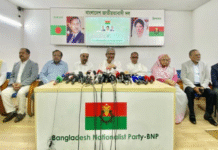When survival is not enough
Kamal Ahmed January 7, 2021

Bangladesh enters its eighth consecutive year without an effective parliamentary opposition. Since 2014, in the last two parliaments, the country has experienced the highly unusual situation of the prime minister designating the Jatiya party — a partner within her own Awami League’s political election alliance with which it had seat-sharing arrangements — to be the official opposition.
However, despite this formality, it is the Bangladesh Nationalist party (BNP) which is perceived as the real challenger to the government, including by the ruling party itself.
The BNP though remains in disarray — with no sign of an end to its perilous state. The result is a mammoth and prolonged political vacuum that Bangladesh has never experienced before. Even those who instinctively dislike the BNP, which still struggles to draw widespread support amongst civil society, are now expressing their frustrations over its failure to be a credible alternative to the Awami League government.
What are the reasons for such a dire situation? There is no doubt that the government led by Awami League has been ruthless in using all available tools of the state to punish and suppress them. The government denied them democratic space even before their controversial boycott of the 2014 national election.
But, apart from the government’s highhanded crackdown on the party, there are many other reasons that have been besetting the reorganisation of the party. BNP’s legacy of malgovernance during its time in power in the 1990s remains a big problem. Another issue that hurts them has been its alliance with Jamaat-e-Islami, widely condemned for its role against the independence war and the creation of Bangladesh. A number of misadventures and blunders, both in power and in the opposition, still haunt the party and continue to be major obstacles in regaining peoples’ trust. This includes the party’s alleged complicity in the grenade attack against the then leader of the opposition, its spectacular failure to institute a national blockade to thwart the 2014 national election, as well as its involvement in violent protests a year later seeking to bring the government down which resulted in the deaths of many civilians.
However, it is now clear that the BNP’s most serious weakness is the absence of a line of succession, a typical element in any party of patrimony. Both the party’s chairperson Khaleda Zia and her successor son, Tarique Rahman have been convicted in separate criminal cases and are unlikely to be able to return to active politics within the country anytime soon. But neither are willing to cede any authority to others within the party, making it impossible for anyone to steer the organisation towards a process of reorganisation which could allow it to mount a challenge to the government in the near future.
Even the secretary general of the party does not have much authority in deciding its political direction or organisational matters independently. The contradictory position he took after the last general election, on the one hand to sacrifice his parliamentary seat in protest at election stealing by the ruling party but on the other hand endorsing half a dozen other opposition MPs to take their seats, suggests strategic weakness. There is further confusion in the party’s decision-making when it continues to take part in elections under the much discredited election commission, thereby granting credibility to the process and the institution, but on the other hand complaining about its partisan behaviour and demanding its resignation.
The so-called standing committee, supposedly the highest decision making body, is almost equally divided between two groups — one comprising party elders with decades of experience but physically unfit and another younger group with ideas and energy but with little command over the party as a whole. The recent issuance of show cause notices to a vice-chairman of the party and prominent freedom fighter Major (retired) Hafizuddin Ahmed and a prominent journalist Shawkat Mahmud are examples of the turmoil that continues to beset the party from within.
The party has no second or third tier leadership who can fill the current void or one that may emerge in the future. It may well be, of course, that this situation was at one point created deliberately so that no one could rise up to challenge the desired succession within the family. It now just looks like weakness.
Despite all these drawbacks and indeed inducements from the government, one remarkable thing about the party is that it has not suffered any major splits. But in the absence of credible opinion polls, it is hard to gauge how much popular support the party has retained or lost during its last one and a half decades in opposition. Its ability to have survived during this period should not, however, usher any hope that it will re-emerge as a credible and strong opposition anytime soon.●
Kamal Ahmed is an independent journalist.
Correction: An earlier version of this article incorrectly stated the number of year that Bangladesh has been without an effective parliamentary opposition. This has been corrected.









